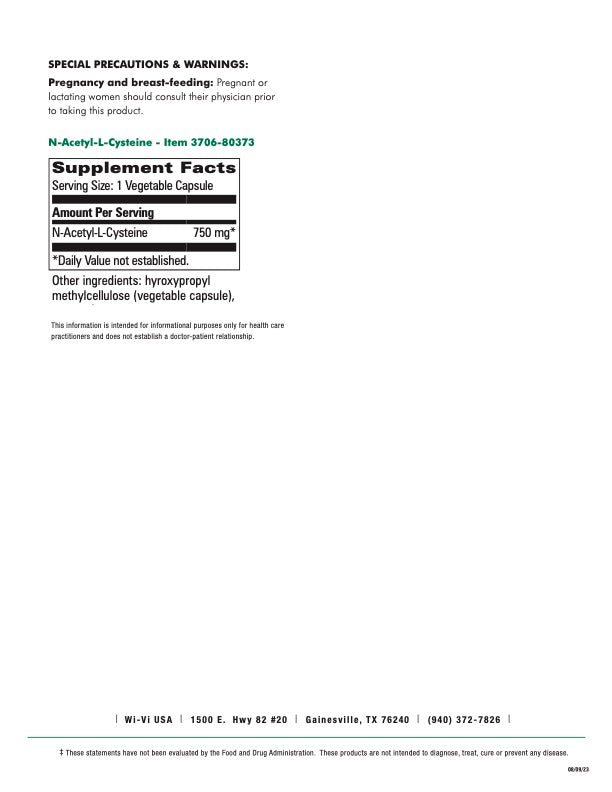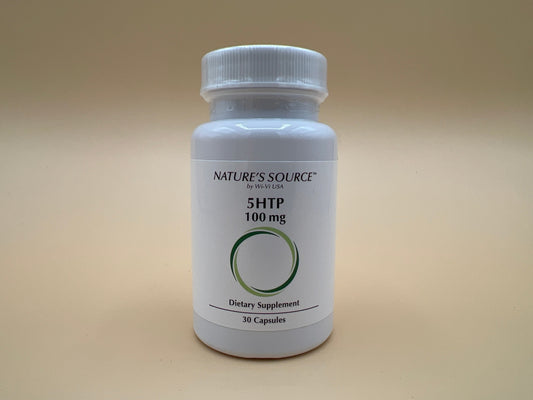Wi-Vi USA
N-Acetyl-L-Cysteine (NAC) 600mg - Respiratory, Antioxidant & Detox Support
N-Acetyl-L-Cysteine (NAC) 600mg - Respiratory, Antioxidant & Detox Support
Couldn't load pickup availability
Powerful Antioxidant & Detoxification Support with NAC
Support your body's natural detoxification, respiratory health, and antioxidant defenses with Nature's Source N-Acetyl-L-Cysteine (NAC). This premium amino acid supplement delivers 600mg of NAC per serving—a powerful precursor to glutathione, your body's master antioxidant—providing comprehensive support for liver detoxification, respiratory function, immune health, and cellular protection.
Key Benefits
- Glutathione Production – NAC is the direct precursor to glutathione, your body's most powerful antioxidant
- Liver Detoxification – Supports liver health and natural detoxification processes
- Respiratory Support – Thins mucus and supports healthy lung function and clear breathing
- Antioxidant Protection – Protects cells from oxidative stress and free radical damage
- Immune System Support – Supports healthy immune function and response
- Brain Health – Supports cognitive function and neuroprotection
- Cellular Health – Supports mitochondrial function and cellular energy
- 120 Vegetable Capsules – Two to four-month supply in vegetarian-friendly capsules
How to Use
Suggested Use: Take 1-2 capsules daily on an empty stomach, or as directed by your healthcare professional. For best results, take consistently as part of your wellness routine.
Pro Tips:
- Take on an empty stomach for optimal absorption (at least 30 minutes before meals)
- Pair with vitamin C to enhance glutathione production
- Stay well-hydrated to support detoxification processes
- For respiratory support, consistent daily use provides best results
- Consider taking with selenium and vitamin E for comprehensive antioxidant support
What's Inside (and What's Not)
Premium Ingredients: N-Acetyl-L-Cysteine (NAC) 600mg per serving
Vegetable Capsules: Suitable for vegetarians and vegans
Free From: Gluten, dairy, soy, artificial colors, flavors, and preservatives
Quality You Can Trust: Third-party tested for purity and potency, manufactured to GMP standards
Why N-Acetyl-L-Cysteine (NAC)?
NAC is a modified form of the amino acid cysteine that's highly bioavailable and serves as the direct precursor to glutathione—your body's master antioxidant and detoxifier. Glutathione is critical for neutralizing free radicals, supporting liver detoxification, protecting cells from oxidative damage, and maintaining immune function. However, glutathione supplements are poorly absorbed, making NAC the most effective way to boost your body's glutathione levels. NAC also has direct benefits including thinning mucus for respiratory support, protecting the liver, supporting brain health, and providing powerful antioxidant protection throughout your body.
The NAC & Glutathione Advantage
Glutathione Production: NAC provides cysteine, the rate-limiting amino acid for glutathione synthesis, effectively boosting glutathione levels
Liver Detoxification: Supports Phase II liver detoxification and protects liver cells from toxins and oxidative damage
Respiratory Health: Breaks down disulfide bonds in mucus, making it thinner and easier to clear from airways
Antioxidant Power: Both NAC and glutathione neutralize free radicals and protect cells from oxidative stress
Immune Support: Glutathione is essential for immune cell function and helps regulate immune response
Brain Protection: Crosses blood-brain barrier to support cognitive function and protect neurons from oxidative damage
Cellular Energy: Supports mitochondrial function and protects against mitochondrial dysfunction
Heavy Metal Chelation: Helps bind and remove heavy metals and environmental toxins
This powerful amino acid provides comprehensive support for detoxification, antioxidant defense, and overall cellular health.
Who It's For
Perfect for anyone seeking powerful antioxidant protection, individuals looking to support liver health and detoxification, people with respiratory concerns or excess mucus, those exposed to environmental toxins or pollutants, adults seeking to boost glutathione levels, individuals looking to support immune function, anyone wanting to support brain health and cognitive function, or people seeking comprehensive cellular protection.
Our Quality Promise
Crafted by Nature's Source with premium-quality N-Acetyl-L-Cysteine in vegetable capsules. Every batch is third-party tested to ensure purity, potency, and the antioxidant and detoxification support you deserve.
Storage & Safety
Storage: Store in a cool, dry place away from direct sunlight.
Warnings: Consult your healthcare provider before use if you are pregnant, nursing, taking medication (especially nitroglycerin, blood thinners, or chemotherapy drugs), have asthma, bleeding disorders, or have a medical condition. NAC may interact with certain medications. May cause digestive upset in some individuals—start with lower dose if needed. Discontinue use if adverse reactions occur. Keep out of reach of children. Do not use if safety seal is broken or missing.
Important: NAC has a characteristic sulfur smell, which is normal. This does not indicate spoilage.
Disclaimer: These statements have not been evaluated by the Food and Drug Administration. This product is not intended to diagnose, treat, cure, or prevent any disease.
Share





-
Free Shipping
With orders of $50 or more!
-
Hassle-Free Exchanges
Exchange your unused , unopened product for free within 2 weeks of order.
Blog posts
View all-

5-HTP: The Mood and Sleep Enhancer You Need to ...
5-Hydroxytryptophan, or 5-HTP, is a natural compound and supplement that has gained attention for its benefits on mood, sleep, and overall well-being. Found naturally in the seeds of Griffonia simplicifolia,...
5-HTP: The Mood and Sleep Enhancer You Need to ...
5-Hydroxytryptophan, or 5-HTP, is a natural compound and supplement that has gained attention for its benefits on mood, sleep, and overall well-being. Found naturally in the seeds of Griffonia simplicifolia,...
-

The Vital Role of Vitamins in Aging Gracefully
Let's delve into why vitamins become more important with age and how they can help us age gracefully.
The Vital Role of Vitamins in Aging Gracefully
Let's delve into why vitamins become more important with age and how they can help us age gracefully.
-

Gen Z , Millennials and Health
In the contemporary landscape of fast-paced lifestyles and evolving dietary preferences, the necessity of adequate nutrition stands as a cornerstone for the well-being of younger generations, particularly Gen Z and...
Gen Z , Millennials and Health
In the contemporary landscape of fast-paced lifestyles and evolving dietary preferences, the necessity of adequate nutrition stands as a cornerstone for the well-being of younger generations, particularly Gen Z and...








